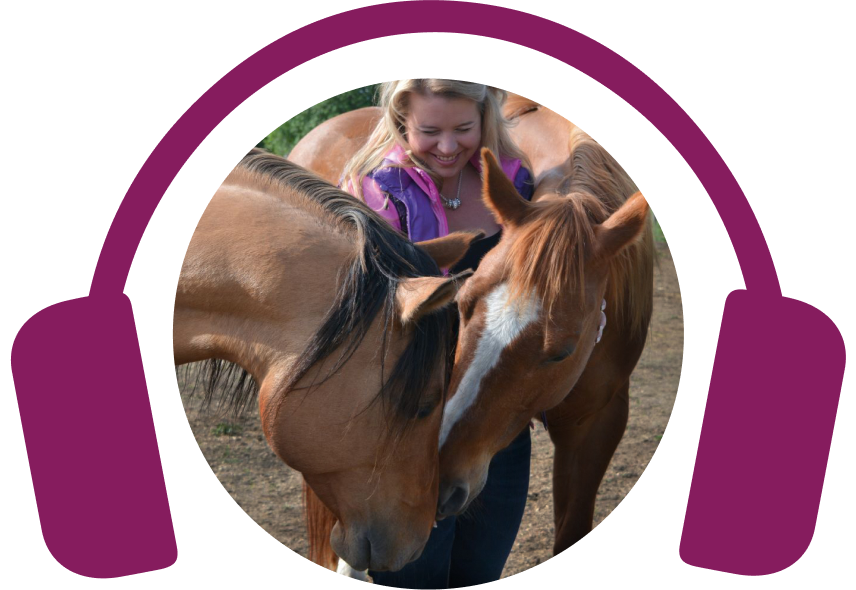Elisha’s Podcast
ELISHA’S PODCAST

Ready to get your horses on the path to better health?
This podcast was created to do just that.
Tune in to get new insights, perspectives, horse health tips, and real-life horse healing stories.
Take what you learn and apply it to your horse TODAY.

One Conversation at a time
From learning what to feed your horse and how to use nutrition effectively, to practicing prevention and approaching specific health challenges naturally, to just bringing your horse more joy and better health…
I’ve got you covered!

Check out my recent episodes
Today, we share seven key pointers to help you, as a horse owner, plan a parasite control program for your horse. In this episode, you will learn how to formulate a parasite program and how to prepare your horse for it. We will also explain how to schedule your program effectively and responsibly. Understanding the Role of Parasites in Equine Health Parasites can affect the health of horses significantly, and they can worsen problems in horses with ulcers, digestive issues, or chronic colic. So, owners should tailor their parasite management to suit the history and needs of each horse. Fecal Testing: A Useful but Limited Tool Even though fecal tests are helpful to monitor parasite loads, they should not be relied upon, as they do not detect every type of parasite, and they may not be effective when the parasites are in certain life stages or encysted in the gut lining. Living environments, pasture management, and herd dynamics can influence parasite exposure and infection risk. So, fecal testing should be part of a broader monitoring system that includes seasonal timing, observation of symptoms, and an understanding of the regional parasite risks. The Limitations of Natural Dewormers Chemical dewormers are necessary when dealing with high parasite loads, as although herbs and homeopathic remedies can support intestinal health and help preventinfestations, they cannot be relied on for treating active infections. Using only herbs in such cases may lead to severe or irreversible damage. The Dangers of Over-Deworming Overusing chemical dewormers could lead to parasite resistance and damage the horse's microbiome. Deworming too often or using the same chemical repeatedly allows the parasites to adapt and reduces the effectiveness of the deworming treatments. It could also add to the growing issue of parasite resistance across all animal species. Deworming Strategically Strategic deworming supports equine health and helps to reduce dewormer resistance in parasites. Strategic deworming means considering the parasite risk of your horse rather than relying on a fixed schedule, reducing the risk of over-deworming, and allowing the deworming drugs to remain effective. Factors like the age of the horse, its health status, pasture conditions, seasonal parasite patterns, and regional risks should all inform your deworming decisions. Handling Deworming Challenges In cases where horses are averse to oral administration of dewormers, training is the answer. Owners can work with trainers or use temporary strategies like mixing dewormers with foods the horse enjoys. When Is the Best Time to Deworm? To time deworming treatments, owners should consider seasonal parasite activity and fecal egg count results. In temperate climates, deworming in late winter or early spring helps reduce pasture contamination before peak parasite transmission in late summer and early fall. Avoid treating during extreme heat or cold when parasites are less active. Some owners prefer to deworm just before or after the full moon, but there is no scientific evidence proving the effectiveness of that. Strengthening the Hindgut and Immune System A healthy gut creates an environment less hospitable to parasites. Supporting digestive immunity with good nutrition and high-quality probiotics helps fortify horses, supports their overall health, and reduces their susceptibility to infestations. Links and resources: Connect with Elisha Edwards on her website Join my email list to be notified about new podcast releases and upcoming webinars. Free Webinar Masterclass: Four Steps to Solving Equine Metabolic Syndrome Naturally Register for Resolving Equine Metabolic Syndrome Naturally, now. This week, we are following up on last week’s topic about the adverse effects of parasites on our horses by talking about fecal egg counts. As horse owners, it is essential to understand what fecal egg counts are, the valuable information they provide, and how to use those insights to evaluate and assess parasite control strategies for your horse or, in some cases, an entire herd. What is a Fecal Egg Count? A fecal egg count is a diagnostic test, usually performed by veterinary clinics, to identify the presence and number of parasite eggs in a horse’s manure. It provides critical information for understanding the intestinal immunity of horses and creating parasite control strategies. Why Fecal Egg Counts Matter Knowing the shedding status of their horses helps owners tailor a targeted and effective parasite control plan. Strongyles, the most prevalent equine parasite, are a big concern for equine health due to their resistance to deworming treatments. Fecal egg counts guide deworming practices and help prevent the overuse of chemical dewormers. Timing and Accuracy Fecal testing is usually done in the spring and fall to align with parasite life cycles. In the fall, parasites often go into hibernation and stop shedding eggs. So spring, when eggs get actively shed, is a far better time to assess parasite load. Relying on a single test can be misleading, whereas multiple tests over time can provide more accurate insights. Parasites Not Detected by Fecal Tests Fecal egg counts do not detect all parasites as some go through life stages where they do not shed any eggs. So, owners must also consider regional risks and symptoms when planning a parasite control strategy for their horses. Parasite Risk Factors Parasites exploit weak immune systems, so immunity is a key factor for susceptibility. The immature immune systems of young horses make them particularly vulnerable, and older horses may also be at risk due to declining health. Domesticated horses, living in controlled environments, are often at greater risk than wild horses as they have less natural resistance and more exposure. Holistic Parasite Management Effective parasite management often requires more than just deworming. Supporting horse's immune systems, microbiomes, and overall health can make the internal environment less hospitable to parasites. A strategic approach should include nutrition, environment, and individualized care for reducing egg counts and building long-term resilience. Hidden Symptoms Horses can look healthy and still carry a high parasite load. So, even though fecal egg counts provide a baseline, it is still essential to evaluate the overall health of each horse. Horses with Chronic Health Conditions Parasites can exacerbate any issues that horses with chronic health conditions may have. High parasite loads can cause ulcers, inflammation, and poor nutrient absorption. Addressing parasites is a top priority in those cases, as the immune system cannot recover until that burden gets reduced. Links and resources: Connect with Elisha Edwards on her website Join my email list to be notified about new podcast releases and upcoming webinars. Free Webinar Masterclass: Four Steps to Solving Equine Metabolic Syndrome Naturally Register for Resolving Equine Metabolic Syndrome Naturally, now. As spring approaches, it is time to start thinking about parasite management. Parasites are a complicated topic that often gets oversimplified when searching for information. A holistic approach always considers the intestinal immunity of each horse, as that varies from horse to horse. However, parasite management tends to become more complex in herd environments where group dynamics play a role. The Impact of Parasites on Horse Health Parasites can have widespread effects on a horse’s body. They contribute to inflammation, disrupt the nervous system, and place stress on multiple organs. Horses with allergies are particularly susceptible because their immune systems are overactive, making it harder to manage infections. If a calm horse suddenly becomes anxious or unmanageable, parasites could be a hidden factor. Parasites and Ulcers When horses struggle with digestive issues, an unresolved parasite infection can complicate their recovery. So, it is essential to address parasites first, as parasites, especially encysted strongyles, damage the intestinal lining, which could exacerbate or trigger ulcers. The Importance of Early and Proper Treatment Promptly addressing parasites is essential for preventing long-term health damage to your horse. Horses with allergies or ulcers are particularly vulnerable, as parasites tend to exacerbate their symptoms. Parasite treatments should be specific to the condition of each horse. It is also essential to consider the possible effects of parasite die-off with older or weaker horses, and veterinary guidance may be needed. The Effectiveness of Herbal Treatments While herbs have some anti-parasitic properties, they cannot be relied on to eliminate a significant infestation, as fecal testing has shown that herbal remedies alone do not effectively reduce parasite counts. Chemical dewormers are the most effective option for controlling parasites, especially in high-load cases. Managing Parasite Resistance Overuse and improper use of dewormers can cause parasite resistance, making it harder to eliminate infections. Even when treated, some horses still carry high parasite loads, and parasites can mutate to withstand certain chemicals. Rotating dewormers and strategically targeting different life stages of parasites are essential strategies for long-term parasite management. Key Takeaways for Responsible Parasite Control A strategic, science-based approach to parasite management is crucial. Regular fecal egg counts can help track parasite levels, and a well-planned deworming schedule prevents resistance from developing. Supporting the microbiome with good nutrition will also help in building overall resilience against infections. Links and resources: Connect with Elisha Edwards on her website Join my email list to be notified about new podcast releases and upcoming webinars. Free Webinar Masterclass: Four Steps to Solving Equine Metabolic Syndrome Naturally Register for Resolving Equine Metabolic Syndrome Naturally, now.
Meet your host
Hi there, I’m Elisha Edwards

Meet your host
Hi there, I’m Elisha Edwards
I have helped guide thousands of horses back to good health over the years from a variety of different health challenges. And through my courses, webinars, and speaking engagements I educate and empower horse owner’s from around the world to take charge of their horse’s health using the holistic model of health care.
So I know first-hand how difficult and overwhelming it can be to navigate all the different opinions and conflicting information that you come across especially when your horse is faced with a health problem. In many cases, the journey is just as hard on the owners as it is on the horses.
I started Healing Horses with Elisha to guide you, support you, and encourage you through the process of prevention and recovery so you feel good about the decisions you’re making for them.
Here’s what I believe
I have seen countless horses with seemingly impossible health conditions that have been resolved so easily with the right combination of diet, nutrition, and natural remedies. In many cases, it is not the health conditions that prevents the horse from recovering, it is the lack of education, resources, and options that are available.
If the insight and information you gain from this podcast gives you some newfound hope or inspires you to take
a new approach then it has served it’s purpose.
Thank you for giving me the opportunity to help you improve your horse’s health.
Keep listening and learning. Your horse is worth it.
Listen Now
Tune in wherever you listen to your podcasts and follow me so you never miss an episode. I release a new one every Tuesday!

Leave a Review
Reviews help me reach more horses and also help me deliver more relevant content to you!

What my Listeners are saying
“Every time I think there is no way to top what you do – you elevate us to yet another level. I wish I had a fraction of your communication skills. You’re amazing and I am so grateful to be apart of the magic you are creating for horses and their humans.”
Tracey
“Your podcasts are fantastic! I get so excited to listen to the next one. I have 6 geriatric horses and your podcast has really opened my mind to new possibilities in their health and given me the strength to help them through hiccups in their well-being the past few months. I have a nursing education and you explain pathology better than my university professors.”
Sharon
“I can’t thank you enough for the Mindset Tips podcast. I really needed this reminder. It was just what I needed to hear to today.”



